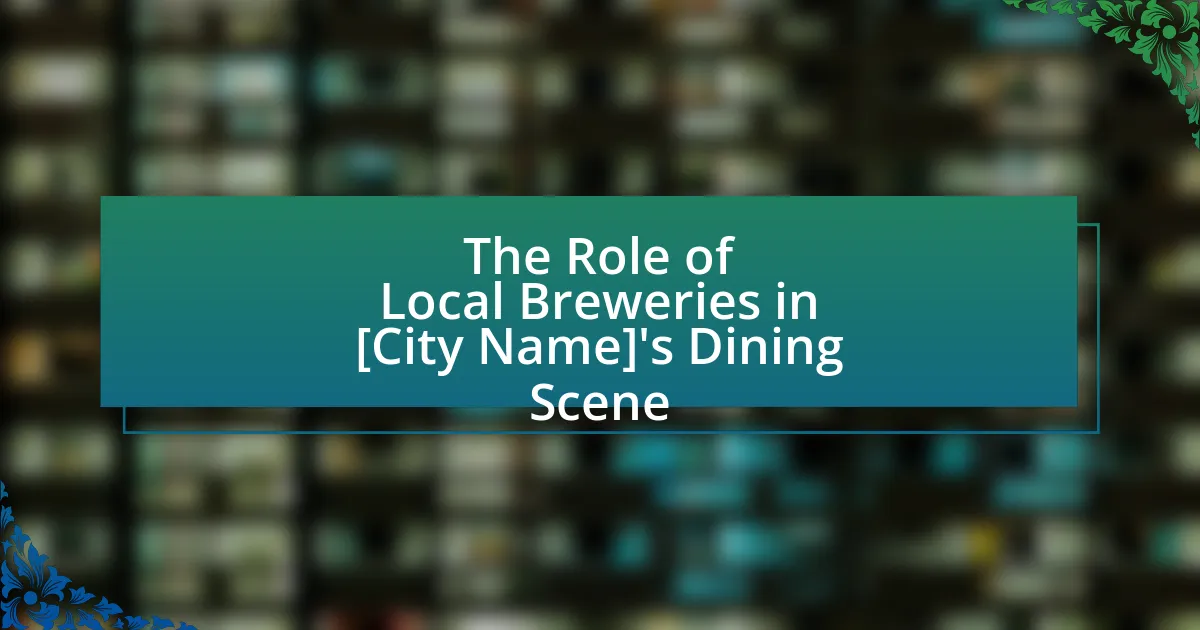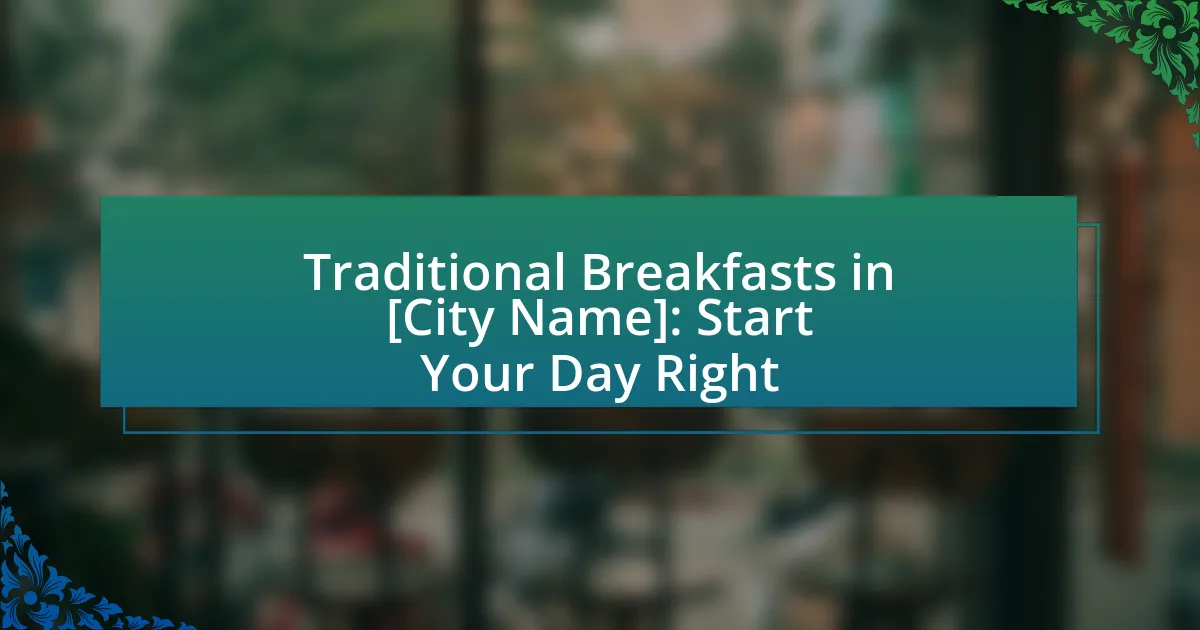The article focuses on exploring the coffee culture of a specific city, examining its evolution, historical influences, and local traditions that shape coffee consumption. It highlights key characteristics of the city’s coffee scene, including popular drinks, the distinction between local cafés and international chains, and the unique experiences available to visitors. Additionally, the article discusses local events and festivals that celebrate coffee culture, recommends must-visit cafés, and offers tips for navigating the coffee landscape effectively. Overall, it provides a comprehensive overview of what makes the city’s coffee culture distinctive and appealing to enthusiasts.
What defines [City Name]’s coffee culture?
It is not possible to answer the question as the specific city name is not provided. Without the city name, I cannot define its coffee culture.
How has [City Name]’s coffee culture evolved over time?
The coffee culture in Seattle has evolved significantly over time, transitioning from a local beverage to a global phenomenon. Initially, coffee consumption in Seattle was modest, primarily centered around small, independent cafes in the 1970s. The establishment of Starbucks in 1971 marked a pivotal moment, popularizing specialty coffee and introducing espresso-based drinks to a wider audience. By the 1990s, Seattle became known for its artisanal coffee scene, with an emphasis on high-quality beans and brewing techniques. Today, the city boasts a diverse range of coffee shops, from traditional cafes to innovative roasteries, reflecting a blend of local and international influences, and contributing to Seattle’s reputation as a coffee capital.
What historical events influenced the coffee scene in [City Name]?
The historical events that influenced the coffee scene in Vienna include the introduction of coffee to the city in the late 17th century, following the Battle of Vienna in 1683, when coffee beans were discovered in the abandoned Ottoman camp. This led to the establishment of the first coffeehouses, such as Café Central in 1876, which became cultural hubs for intellectuals and artists. The coffeehouse culture flourished in the 19th century, coinciding with the Austro-Hungarian Empire’s expansion, promoting social interaction and the exchange of ideas. These events collectively shaped Vienna’s reputation as a center for coffee culture, where coffeehouses became integral to social life and intellectual discourse.
How do local traditions shape coffee consumption in [City Name]?
Local traditions significantly influence coffee consumption in the city, as they dictate the rituals, preferences, and social contexts surrounding coffee drinking. For instance, in many cultures, coffee is not just a beverage but a central part of social gatherings, often served during specific ceremonies or family events. In cities with a rich coffee heritage, such as those in Italy or Ethiopia, traditional brewing methods and specific types of coffee beans are favored, reflecting local tastes and historical practices. These traditions can also dictate the time of day coffee is consumed, the manner in which it is prepared, and the accompanying snacks or meals, thereby shaping the overall coffee culture in the city.
What are the key characteristics of [City Name]’s coffee culture?
It is not possible to answer the question regarding the key characteristics of a specific city’s coffee culture without knowing the name of the city. Each city’s coffee culture has unique traits influenced by local history, preferences, and café styles. Please provide the name of the city for a precise answer.
What types of coffee drinks are popular in [City Name]?
It is not possible to answer the question about the types of coffee drinks popular in a specific city without knowing the name of that city.
How do local cafés differ from international chains in [City Name]?
Local cafés in [City Name] differ from international chains primarily in their unique offerings and community engagement. Local cafés often emphasize locally sourced ingredients, seasonal menus, and personalized customer service, creating a distinct atmosphere that reflects the culture and preferences of the community. In contrast, international chains typically provide standardized products and a uniform experience across locations, prioritizing efficiency and brand consistency. This distinction is evident in the variety of specialty drinks and artisanal pastries found in local cafés, which cater to local tastes and trends, while international chains focus on popular, globally recognized items.
Why is [City Name] considered a coffee destination?
[City Name] is considered a coffee destination due to its rich coffee culture, characterized by a diverse range of specialty cafés and a strong emphasis on quality sourcing and brewing techniques. The city hosts numerous coffee festivals and events that celebrate local roasters and baristas, showcasing unique blends and brewing methods. Additionally, [City Name] has a high concentration of artisanal coffee shops, many of which prioritize direct trade relationships with coffee farmers, ensuring ethical sourcing and exceptional flavor profiles. This commitment to quality and community engagement solidifies [City Name]’s reputation as a premier location for coffee enthusiasts.
What unique coffee experiences can visitors expect in [City Name]?
Visitors can expect unique coffee experiences in Seattle, characterized by its rich coffee culture and innovative cafés. Seattle is home to the original Starbucks, which offers a glimpse into the city’s coffee history, while local roasters like Stumptown and Victrola provide tastings of meticulously sourced beans. Additionally, visitors can explore themed cafés such as the Cat Café, where they can enjoy coffee in the company of adoptable cats, or the Chocolate Café, which pairs artisanal coffee with gourmet chocolates. Seattle’s coffee scene also features numerous coffee tours that educate participants on the brewing process and the city’s coffee heritage, making it a vibrant destination for coffee enthusiasts.
How do local events and festivals celebrate coffee culture in [City Name]?
Local events and festivals in [City Name] celebrate coffee culture by showcasing local roasters, baristas, and coffee-related activities. These events often feature coffee tastings, brewing demonstrations, and competitions that highlight the skills of local artisans. For example, the annual [specific festival name] attracts thousands of coffee enthusiasts, offering workshops and seminars that educate attendees about coffee origins, brewing techniques, and flavor profiles. Additionally, local cafés participate by creating unique blends and signature drinks exclusive to the festival, fostering community engagement and promoting local businesses.
What are the best cafés to visit in [City Name]?
It is not possible to provide an answer without specifying the city name. Please provide the name of the city to identify the best cafés to visit.
Which cafés offer the most authentic local coffee experience?
The cafés that offer the most authentic local coffee experience include Café de Flore and Les Deux Magots in Paris, known for their historical significance and traditional French coffee culture. These establishments have been frequented by famous writers and artists, contributing to their reputation as cultural landmarks. Additionally, they serve classic French coffee beverages, enhancing the local experience.
What are the must-try signature drinks at these cafés?
The must-try signature drinks at these cafés include the Nitro Cold Brew, which is known for its smooth texture and rich flavor, and the Lavender Latte, celebrated for its unique floral notes. Additionally, the Mocha Mint, a blend of chocolate and mint flavors, stands out as a refreshing choice. These drinks are crafted using high-quality ingredients and innovative brewing techniques, ensuring a memorable coffee experience.
How can visitors navigate [City Name]’s coffee scene effectively?
Visitors can navigate the coffee scene in the city effectively by utilizing local coffee guides, apps, and social media platforms that highlight popular cafés and specialty roasters. These resources often provide reviews, ratings, and recommendations based on the preferences of coffee enthusiasts, making it easier to discover unique offerings. Additionally, participating in coffee tours or workshops can enhance the experience by providing insights into the local coffee culture and brewing techniques.
What tips should first-time visitors keep in mind when exploring cafés in [City Name]?
First-time visitors exploring cafés in a city should prioritize understanding local coffee culture, as it varies significantly from place to place. Familiarizing oneself with popular local beverages, such as specialty lattes or traditional brews, enhances the experience. Additionally, checking café reviews on platforms like Yelp or Google can provide insights into the best spots to visit, ensuring a satisfying selection. Engaging with baristas can also enrich the visit, as they often share recommendations and insights about the café’s offerings. Lastly, visiting during off-peak hours can lead to a more relaxed atmosphere and better service, allowing visitors to fully enjoy their experience.
How can visitors find hidden gems among [City Name]’s coffee shops?
Visitors can find hidden gems among the city’s coffee shops by exploring local neighborhoods and seeking recommendations from residents. Engaging with community forums, social media groups, and local food blogs can provide insights into lesser-known cafés that offer unique atmospheres and specialty brews. Additionally, utilizing apps that highlight user reviews and ratings can guide visitors to discover these hidden spots, as many of them may not be prominently featured in mainstream guides.
![A Taste of [City Name]: Must-Try Dishes for First-Time Visitors](https://cityofleadville.com/wp-content/uploads/Featured-image-A-Taste-of-City-Name-Must-Try-Dishes-for-First-Time-Visitors-150x150.webp)
![Historical Dishes of [City Name]: Recipes with a Story](https://cityofleadville.com/wp-content/uploads/Featured-image-Historical-Dishes-of-City-Name-Recipes-with-a-Story-150x150.webp)

